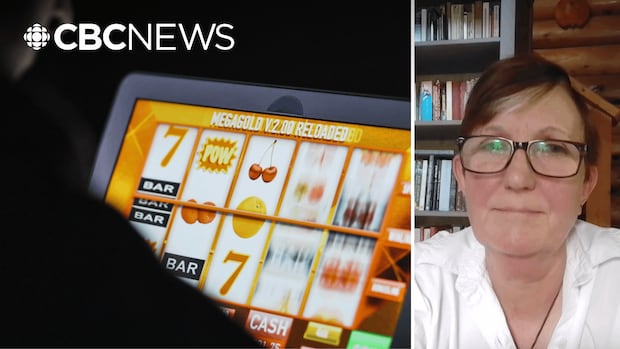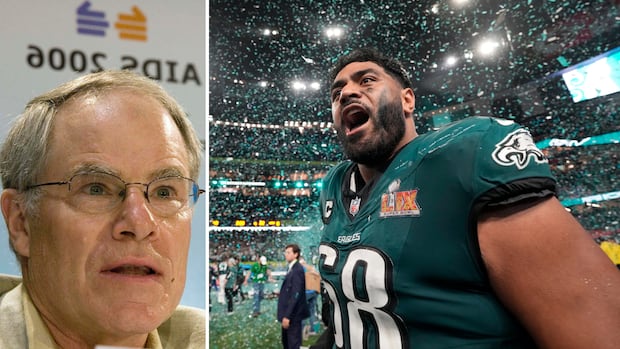Doctors are calling for restrictions on sports betting ads, saying they are setting youth up for a future of problem gambling.
“I have seen people’s lives fall apart at all ages, from all walks of life, whether it’s an accountant with a career behind him, or a kid who’s just looking to maximize his college fund who then had lost it all within a matter of a few weeks,” said family physician Dr. Shannon Charlebois, who is also the medical editor at the Canadian Medical Association Journal (CMAJ.)
Charlebois and Dr. Shawn Kelly published an editorial in the CMAJ on Monday about how betting ads are everywhere during sports broadcasts and the legalization of online gambling has made every smartphone a potential betting platform.
Even if ads aren’t targeting youth, they still see them and are affected, said Kelly, who watches sports with his twin children.
“These ads are not directed at the nine-year-olds sitting with me, but they are picking up on it,” said Kelly, who is an adolescent addiction specialist.
 Dr. Shawn Kelly, an adolescent addiction specialist, believes that even if ads aren’t targeting youth, it will still affect them. He recently co-authored an editor for the Canadian Medical Association about ads during sports broadcasts. (Pierre-Paul Couture/CBC)An emerging issue
Dr. Shawn Kelly, an adolescent addiction specialist, believes that even if ads aren’t targeting youth, it will still affect them. He recently co-authored an editor for the Canadian Medical Association about ads during sports broadcasts. (Pierre-Paul Couture/CBC)An emerging issue
While Kelly primarily focuses on substance use cases, he works with all addictive disorders, and has started to screen for gambling behaviour — something he believes is an emerging issue.
“I have seen an increase in harms from gambling in people who are under the age where they should be legally allowed to engage in any gambling,” he told CBC News on Monday.
“The typical story that I see in the clinic is a 13- or 14-year-old boy who has borrowed dad’s credit card, or mom’s credit card, engaged in some online wagering and lost a significant amount of money.”
WATCH | Online gambling activity increased among B.C. youth, report finds:
Online gambling activity seeing an increase among B.C. youth: report
A recent report from the McCreary Centre Society analyzed findings from the B.C. Adolescent Health Survey in 2023, which was completed by over 38,000 youth aged 12–18 in 59 of B.C.’s 60 school districts. Annie Smith, the report’s co-author, said online gambling activity had increased among youth since the last survey in 2018.
Kelly says gambling addiction still carries a lot of stigma, so people try to hide it and can be hesitant to seek treatment.
He says studies from Norway, the U.K. and Canada have shown hundreds of teenagers reporting low to moderately severe gambling problems. He notes this has been the greatest increase of concern in his clinic and can create financial and emotional stress for both the youths involved and their families.
The long-term harms of gambling addiction
Kelly says there are also other associated harms that come with gambling issues.
“We know that substance use goes up, we know that other criminality or delinquency increases as well,” he said, adding that there can also be an increase in suicidality associated with gambling behaviours.
Dr. Nigel Turner, a scientist at the Centre for Addiction and Mental Health in Toronto, told CBC News that most people who have gambling problems later in life start before the age of 19.
“Generally, it’s something that occurs over a lifetime,” said Turner. “If you start gambling when you’re young, you establish a habit of gambling that can echo throughout your life and get you into serious financial problems.”
A 2024 report by the Lancet Public Health Commission on Gambling, said gambling “poses a substantial threat to public health,” and urged governments to mitigate public health harms.
“When people hit that point in their gambling career where they can no longer find any resources and they’re desperate for money [and] embarrassed about how much they’ve lost … suicide is something they many gamblers will contemplate as their only way,” said Turner.
Efforts to limit youth exposure
Charlebois says that while betting sites say they’re only for people 19 and older, youth are being inundated with advertising that equates enjoying sports with betting.
She says the brains of children and teens are still developing and the constant exposure to gambling messages normalizes harmful behaviours they can carry into adulthood.
“What’s very dangerous about this for children is that it’s normalizing a known harmful behaviour during an impressionable stage. And it’s really appealing in particular to youth who are genetically, biologically predisposed to enjoy risk-taking,” she said.
WATCH | Has sports betting gone too far?
Former Olympian decries ‘fire hose’ of gambling ads during Super Bowl
University of Toronto professor Bruce Kidd, a former track and field athlete and chair of a campaign to ban gambling advertisements, told CBC’s On The Coast Monday that the advertisements poison the idea of sport and are addicting a growing number of people into very serious forms of psychological harm.
Charlebois says a bill to regulate sports betting advertising has been introduced in the Senate and if passed, would be a good start to addressing the problem.
She would like to see gambling advertising restricted during games and removed from social media platforms used by youth.
“There’s no limit on how many of these ads can be placed within a sports broadcast or how long they can be,” Charlebois said, noting that in addition to commercials, the names of sports betting platforms are projected onto football fields and hockey rinks.
WATCH | Gambling ads poison the idea of sport, says former Olympian Bruce Kidd:
Sports betting has gone full throttle, but has it gone too far?
Since 2021, when federal legislation loosened up the rules around sports betting, Ontario has gone full throttle, creating what many have called a Wild West gambling environment. CBC’s Jamie Strashin explores how single-game betting has changed the game for some fans and why addiction experts are worried.Education over restriction
“There is lots of regulation of advertising,” Paul Burns, the president and CEO of the Canadian Gaming Association (CGA) told CBC News on Monday. “
Burns says CGA has been tracking the data and that online gambling ads represent about two per cent of total ads on television and about five per cent of the total spend in TV advertising.
“Even in last year’s NHL playoffs, a gambling company didn’t make the top 10 advertisers,” he said, noting that betting advertisements on NHL broadcasts were at four per cent last year, down from six per cent the year before.
He agrees that it’s important that advertising be done in a responsible way — especially when it comes to youth — but believes in education and awareness rather than limiting access.

